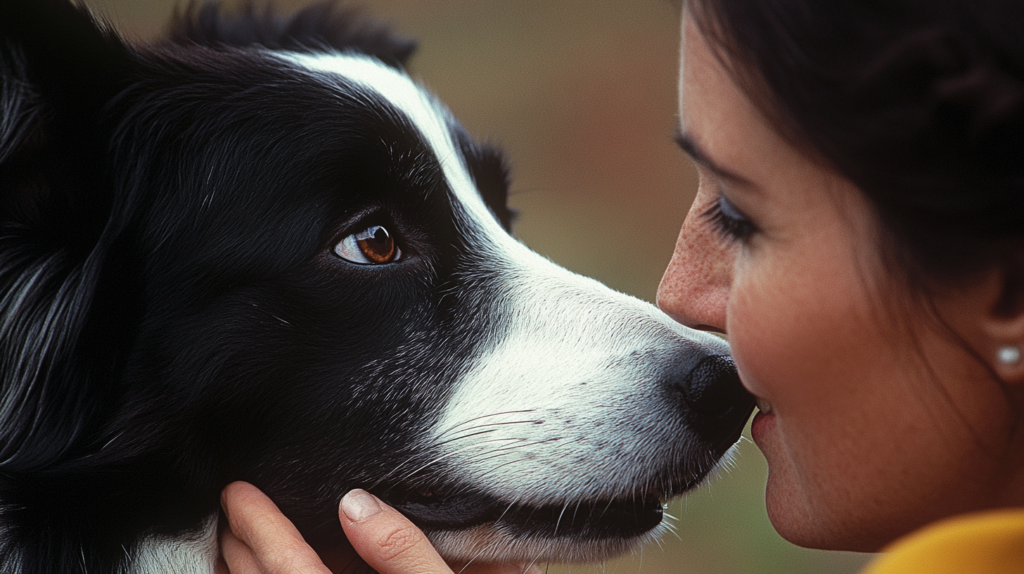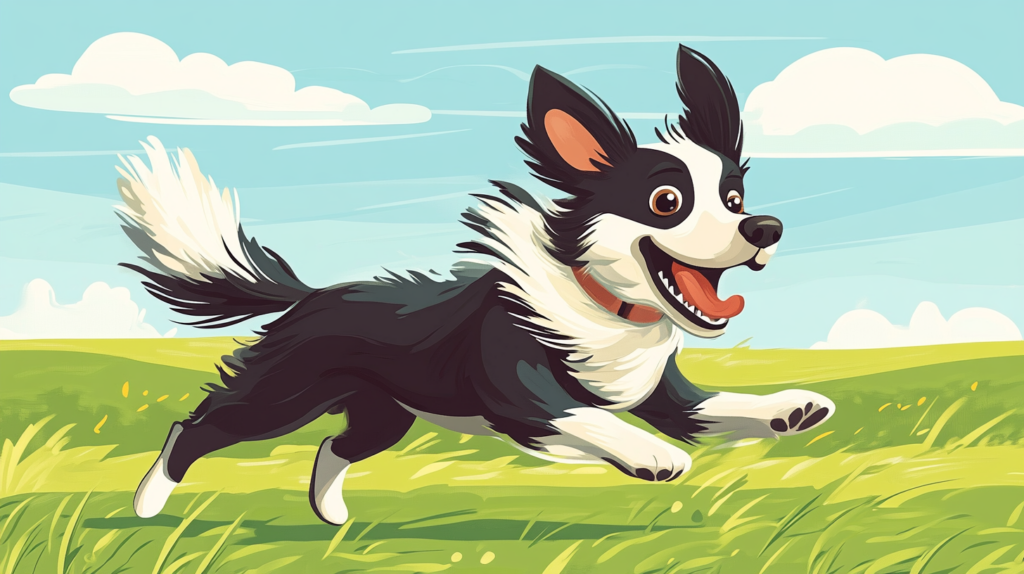Understanding Border Collie Health Issues
Border Collies are often celebrated for their intelligence, agility, and herding instincts. These delightful dogs thrive on mental and physical challenges, making them a favorite among active families and working farms. However, potential owners should be aware of various Border Collie health issues that can impact their beloved companions.
Understanding these health concerns is crucial for both prospective and current owners. Being informed allows for proactive measures in maintaining your dog’s well-being. Here are some key points to consider:
- Common health problems: Awareness of prevalent conditions such as hip dysplasia, epilepsy, and eye disorders like Collie Eye Anomaly (CEA) can lead to better care.
- Genetic predispositions: Certain genetic health problems, including the Multidrug Resistance Mutation (MDR1), may arise within this breed.
- Long-term health: By recognizing these risks early, owners can take steps to ensure their Border Collies lead long, healthy lives.
1. Musculoskeletal Disorders
Border Collies are energetic and agile, but their active lifestyle can put them at risk for certain musculoskeletal disorders.
Hip Dysplasia
Hip dysplasia is a common condition among Border Collies, characterized by an improper fit of the hip joint into the hip socket. This malformation can lead to pain, lameness, and difficulty in mobility. Symptoms may not appear until later in life, making early detection crucial. Keeping an eye out for:
- Reluctance to exercise
- Difficulty rising or jumping
- A noticeable limp
Veterinarians often recommend X-rays to diagnose this issue accurately.
Osteochondritis Dissecans (OCD)
Another joint-related concern is osteochondritis dissecans (OCD). This condition occurs during the growth phase of younger dogs, leading to inflammation and cartilage damage in the joints. It can result in:
- Swelling around the affected joint
- Pain during movement
- Difficulty with normal activities like running or playing
Prompt veterinary intervention can help manage symptoms and improve your dog’s quality of life.
The Weight Connection: Canine Obesity
Maintaining a healthy weight plays a vital role in preventing joint issues. Canine obesity exacerbates existing conditions like hip dysplasia and OCD, putting additional strain on joints. Owners should be aware of the following:
- Regularly monitor your dog’s weight and body condition.
- Provide a balanced diet tailored to their energy needs.
- Incorporate daily exercise routines to keep them active.
By prioritizing weight management, you can significantly reduce the risk of musculoskeletal disorders in your Border Collie, allowing them to enjoy their playful nature without discomfort. Understanding these health concerns is essential for every owner looking to provide their furry friend with a long, happy life filled with activity and joy!

2. Neurological Disorders
Canine epilepsy is a significant concern for Border Collies, known for its recurring seizures. This breed can show various types of epilepsy, with idiopathic epilepsy being the most prevalent. The term “idiopathic” essentially means that the underlying cause remains unknown, although it often has genetic ties.
Signs and Symptoms to Watch For:
- Seizures: These may manifest as convulsions, twitching, or loss of consciousness.
- Behavioral Changes: Unusual behavior before or after a seizure can indicate neurological distress.
- Disorientation: Affected dogs may seem confused or dazed during and after an episode.
If you notice any of these signs in your furry companion, it is crucial to consult a veterinarian for proper evaluation and diagnosis.
Importance of Genetic Testing
Genetic testing plays a vital role in managing the health of Border Collies, especially when it comes to epilepsy. By identifying affected dogs and their potential breeding mates, responsible breeding practices can be established. This proactive approach helps minimize the risk of passing on genetic predispositions to future generations.
Regular veterinary visits and discussions about genetic testing can enhance understanding not only for current owners but also for those considering adding a Border Collie to their family. Prioritizing health awareness fosters a happier, healthier life for our beloved four-legged friends as they navigate their vibrant world.

3. Eye Conditions
Border Collies, known for their intelligence and agility, also face specific eye health challenges that can impact their quality of life. Understanding these conditions is vital for any owner.
Collie Eye Anomaly (CEA)
- Description: CEA is a hereditary condition commonly seen in Border Collies. It affects the development of the eye, leading to potential vision problems. The severity varies; some dogs may experience mild issues while others can be severely affected.
- Symptoms: Signs include abnormal eye shape or size, and in more severe cases, it can lead to blindness. Regular veterinary check-ups are crucial for early detection.
Progressive Retinal Atrophy (PRA)
- Overview: PRA is another significant concern in the Border Collie health landscape. This degenerative disease affects the retina, leading to a gradual loss of vision.
- Impact: Initially, dogs may show night blindness followed by a decline in day vision. As the condition progresses, it can result in complete blindness.
- Genetic Testing: Responsible breeders often conduct genetic testing to identify carriers of PRA. Awareness helps prevent breeding affected dogs, contributing to healthier future generations.
Being proactive about these eye conditions enhances your furry friend’s well-being. Regular screenings and informed breeding practices play a crucial role in managing these hereditary risks. Keep an eye on your Border Collie’s health—their bright eyes should shine as brightly as their spirited personalities!

4. Hearing Impairments
Deafness in Border Collies is an important health consideration for owners. This breed has a prevalence rate of approximately 3.6% for hearing impairments, and understanding its causes helps owners take responsibility.
Potential Causes of Deafness:
- Genetic Factors: Many cases of deafness are inherited. Puppies born to deaf parents have a significantly higher risk of also being deaf, especially those with the merle coat pattern.
- Environmental Influences: Exposure to loud noises or certain medications during critical developmental stages can contribute to hearing loss.
Signs to Watch For:
- Lack of response to sounds or commands
- Not reacting to doorbells or other household noises
- Unusual behavior, such as increased barking or howling
Early detection plays a crucial role in managing deafness. Dogs that are deaf can still lead happy lives with the right training and care. Visual cues and consistent routines help them navigate their environment effectively.
Understanding these factors gives Border Collie owners the knowledge they need to provide a fulfilling life for their furry companions, ensuring that any hearing impairments do not hinder their training or bonding experiences.

5. Hormonal Disorders
Hypothyroidism is a common hormonal disorder affecting Border Collies, arising from an underactive thyroid gland. This condition can lead to a variety of symptoms that may impact your furry friend’s quality of life.
Symptoms of Hypothyroidism
- Weight Gain: Despite a normal diet and exercise routine, dogs may become overweight.
- Lethargy: A noticeable decrease in energy levels can occur, making your pup less playful.
- Skin Issues: Dogs may develop dry skin, hair loss, or a dull coat.
- Cold Intolerance: Increased sensitivity to cold temperatures could be observed.
Treatment Options
Recognizing these symptoms early is crucial for effective management. Diagnosing hypothyroidism typically involves blood tests to measure hormone levels. If diagnosed, treatment often includes:
- Thyroid Hormone Replacement Therapy: Lifelong medication helps restore hormone levels, allowing your dog to thrive.
- Regular Monitoring: Routine vet check-ups ensure proper dosage and track any changes in health.
This condition can be managed successfully with appropriate care and attention. Understanding the signs and keeping up with veterinary visits can help maintain your Border Collie’s overall well-being while mitigating the effects of hypothyroidism.

6. Heart Disorders
Heart health is crucial for the well-being of your Border Collie. One notable condition to be aware of is Patent Ductus Arteriosus (PDA). This congenital heart defect occurs when a blood vessel called the ductus arteriosus, which should close after birth, remains open (patent). This can lead to an abnormal flow of blood between the aorta and pulmonary artery, putting extra strain on the heart.
Key Characteristics of PDA:
Symptoms:
- Difficulty breathing
- Poor growth or failure to thrive
- Coughing
- Fatigue during exercise
Diagnosis:
A veterinarian may use chest X-rays, echocardiograms, or other imaging techniques to confirm PDA.
Treatment Options:
Surgical intervention is often necessary to close the ductus arteriosus. Medications may be prescribed to manage symptoms until surgery can be performed.
Understanding Patent Ductus Arteriosus is vital for Border Collie owners. Early detection plays a significant role in managing this condition effectively, ensuring your furry friend stays active and happy. Keeping an eye on any unusual signs can help promote optimal heart health in your beloved companion.

7. Genetic Health Problems
Border Collies, known for their energy and intelligence, are unfortunately prone to several genetic health issues that potential owners should be aware of. Understanding these conditions is crucial for ensuring the well-being of your furry friend.
1. Multidrug Resistance Mutation (MDR1)
This genetic mutation affects the dog’s ability to process certain medications. Dogs with the MDR1 mutation may experience severe adverse reactions to common drugs, including some used for treating parasites or pain relief. Recognizing this sensitivity is vital for avoiding harmful treatments.
2. Trapped Neutrophil Syndrome (TNS)
A rare inherited disorder, TNS impacts the immune system by preventing neutrophils (a type of white blood cell) from exiting the bloodstream. Affected dogs may suffer from recurrent infections and other immune-related complications, making it essential for breeders to screen their dogs before breeding.
3. Neuronal Ceroid Lipofuscinosis (CL)
This progressive degenerative condition affects the nervous system in Border Collies. Symptoms often start with behavioral changes and can progress to severe neurological issues, including seizures and loss of coordination. Awareness of CL is critical for breeders to avoid producing affected puppies.
Understanding these genetic disorders empowers both current and prospective owners. Genetic testing can help identify these predispositions in individual dogs, allowing for informed decisions regarding breeding and care practices that prioritize health and longevity. By staying informed about these potential challenges, you can help ensure a healthier future for your beloved Border Collie companion.

Preventing Health Issues Through Responsible Ownership Practices
Caring for a Border Collie goes beyond regular walks and playtime. Embracing responsible ownership practices is essential to minimize health risks and ensure a happy life for your furry friend.
Responsible Breeding Practices
Choosing a reputable breeder plays a pivotal role in the health of future generations. Responsible breeders prioritize:
- Genetic Testing: Screening for common inherited disorders such as MDR1, TNS, and CL is crucial. This helps avoid passing on genetic issues that could impact the health of puppies.
- Health Clearances: Ensuring breeding dogs have been tested and cleared for hip dysplasia, eye conditions, and other prevalent issues can significantly reduce risks.
- Educating Buyers: A good breeder will provide potential owners with detailed information about the breed’s health concerns and what to expect.
Importance of Regular Veterinary Check-Ups
Routine vet visits serve as the frontline defense in maintaining your Border Collie’s health. Regular check-ups allow for:
- Early Detection: Identifying potential health problems before they escalate into serious conditions can save time, money, and heartache.
- Vaccinations and Preventive Care: Keeping up with vaccinations and preventive treatments ensures that your dog stays protected against various diseases.
- Nutritional Guidance: Veterinarians can provide tailored advice on diet, helping prevent obesity-related issues that are common in this breed.
By prioritizing responsible breeding practices and regular veterinary care, owners can significantly enhance the quality of life for their beloved Border Collies. These proactive measures lay the foundation for a long, healthy friendship filled with tail wags and countless adventures ahead!
Maintaining Optimal Health: Nutrition, Exercise, Grooming Needs
Border Collies thrive on a well-rounded approach to health that incorporates nutrition, exercise, and grooming. This breed’s energetic and intelligent nature demands specific considerations to ensure they remain happy and healthy.
Nutrition
Finding the right food for Border Collies is crucial for their well-being. Look for high-quality kibble formulated specifically for their size and energy level. Key dietary considerations include:
- Protein Content: A diet rich in animal protein supports muscle development and overall vitality.
- AAFCO Guidelines: Always choose foods that meet the standards set by the Association of American Feed Control Officials (AAFCO). This ensures the food provides balanced nutrition tailored for active breeds.
- Avoid Fillers: Limit foods with excessive fillers such as corn or soy, which can lead to weight gain and other health issues.
Maintaining a healthy weight is essential, as obesity can exacerbate joint problems and other Border Collie health concerns.

Exercise Requirements
Active minds need active bodies! Effective exercise routines should provide both physical stimulation and mental enrichment:
- Daily Walks: Aim for at least 60–90 minutes of walking or running each day. This helps burn off excess energy.
- Agility Training: Incorporate agility courses or obstacle training to engage your dog mentally while challenging them physically.
- Interactive Toys: Use puzzle toys or treat-dispensing gadgets to stimulate your Border Collie’s brain during downtime.
- Fetch Games: Playing fetch can be an excellent way to combine exercise with fun while also reinforcing obedience commands.
By adhering to these guidelines, you not only support your Border Collie’s physical health but also cater to their mental needs, fostering a balanced lifestyle that prevents behavioral issues stemming from boredom.
Grooming Needs
In addition to nutrition and exercise, grooming plays a vital role in maintaining optimal health. Regular brushing helps reduce shedding and keeps their coat healthy. Bathing should be done as needed, ensuring your pup remains fresh without stripping natural oils.
Lifespan And Health Considerations In Border Collies
The average lifespan of a Border Collie typically ranges from 12 to 15 years. This impressive longevity can be influenced by several factors, including:
- Genetics: Some dogs may inherit health issues that can shorten their lifespan.
- Lifestyle Choices: Proper nutrition, regular exercise, and mental stimulation play crucial roles in promoting a longer, healthier life.
- Veterinary Care: Routine check-ups help catch potential health problems early, making treatment more effective.
Understanding these influences is essential for current and prospective owners. By focusing on both genetics and care, you can significantly impact your Border Collie’s overall health, enhancing their quality of life and ensuring they remain a playful companion for many years. Prioritizing their needs allows you to celebrate countless tail-wagging moments together!

Conclusion: Ensuring A Healthy Future For Your Beloved Companion
Understanding Border Collie health issues is crucial for every owner. Certain health problems may be more common in this breed, yet proactive measures can dramatically enhance their quality of life. Here are some essential steps:
- Regular Vet Check-ups: Early detection of health concerns can lead to effective management.
- Tailored Nutrition: High-quality food formulated for their energy needs supports overall well-being.
- Steady Exercise Regimens: Physical and mental stimulation prevents boredom-related behaviors.
- Grooming Care: Regular grooming helps maintain their coat and skin health.
By focusing on these key areas, you can help your Border Collie thrive. With the right approach, we can ensure our furry friends live long, joyful lives filled with activity and love! 🐾
FAQs (Frequently Asked Questions)
What are the common health issues in Border Collies?
Common health issues in Border Collies include hip dysplasia, epilepsy, eye problems such as Collie Eye Anomaly (CEA) and Progressive Retinal Atrophy (PRA), as well as genetic disorders like Multidrug Resistance Mutation (MDR1).
How can I prevent health issues in my Border Collie?
Preventing health issues in Border Collies involves responsible breeding practices to minimize genetic risks, regular veterinary check-ups for early detection of health concerns, and maintaining a healthy diet and exercise routine tailored to their needs.
What is hip dysplasia and how does it affect Border Collies?
Hip dysplasia is a musculoskeletal disorder that affects the hip joint’s development, leading to mobility issues. It is particularly concerning in Border Collies due to their active nature, making it essential to monitor their weight and activity levels.
What are the signs of epilepsy in Border Collies?
Signs of epilepsy in Border Collies can include seizures, unusual behavior before or after a seizure, and temporary disorientation. If you suspect your dog may have this condition, it’s important to consult with a veterinarian for proper diagnosis and management.
What dietary considerations should I keep in mind for my Border Collie?
Border Collies require high-quality kibble formulated specifically for their size and energy level. It’s important to follow AAFCO guidelines for nutrition and ensure they receive balanced meals that support their active lifestyle.
What is the average lifespan of a Border Collie?
The average lifespan of a Border Collie ranges from 12 to 15 years. Factors influencing their longevity include genetics, lifestyle choices made by owners, and overall health management throughout their lives.







